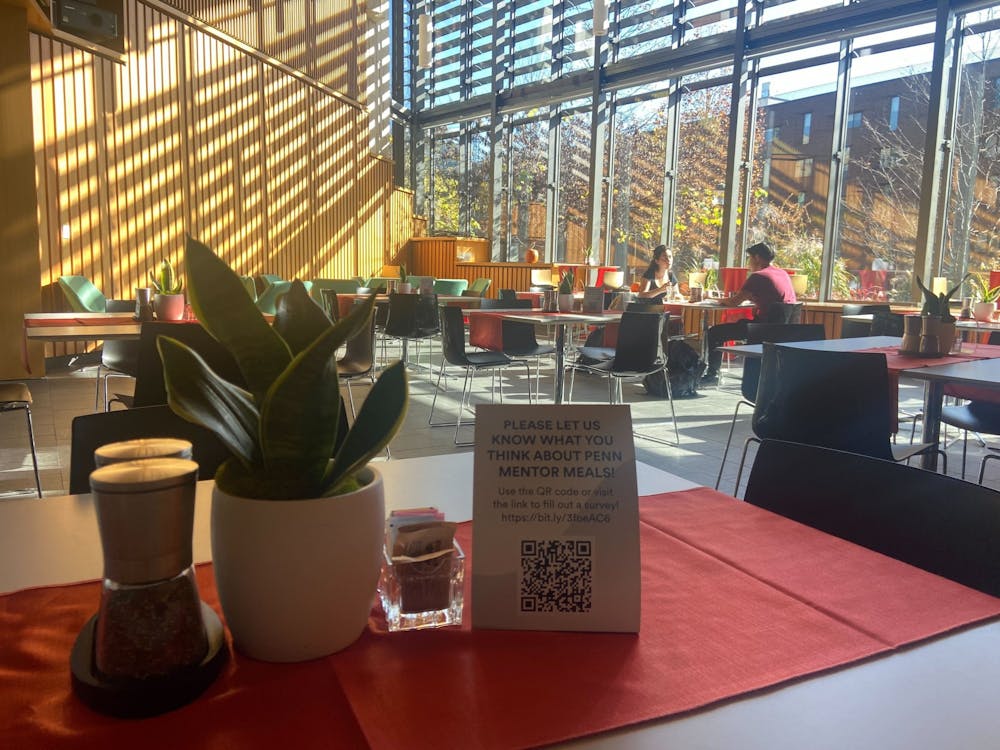
The Penn Mentor Meals Program launched on Nov. 1, allowing students to invite their mentor to a free lunch served at the Lauder Dining Cafe.
Credit: Camellia BùiThe Penn Mentor Meals Program — a new version of the Take Your Professor to Lunch program — launched this month, allowing students to invite their mentor to a free lunch served at the Lauder Dining Cafe.
Troy Majnerick, Associate Director of the New Student Orientation & Academic Initiatives, said that the program is a rebrand of the Take your Professor to Lunch program, with more “sophisticated” features, but the same goal: to foster mentorship relationships for all Penn members. The mentors include any current or past professors, TAs, advisors, RAs, PHINS, Peer Advisors, cohort leaders, or members of Penn’s professional staff.
The Take Your Professor to Lunch Program — which was halted by COVID-19 dining regulations — was a SCUE initiative that was later officially undertaken by the Provost Office, NSOAI, and Business Services.
Andrea Naughton, who is the assistant director of NSOAI, said that Penn Mentor Meals aims to create a space for members of the Penn community to foster deeper relationships with mentors or people they work with on a daily basis. This will allows mentors and students to engage in deeper conversations beyond the conventional spaces where they would typically interact, Naughton said.
As opposed to the Take Your Professor to Lunch at Penn program — where lunches and dinners were served at regular dining halls — students and mentors are catered to a more “elevated” experience in the Lauder Dining Cafe, with more refined menu options and restaurant-style dining space, according to Majnerick.
Pamela Lampitt, Director of Business Services, said that Penn Dining wants to emulate the experience of the original Take Your Professor to Lunch at University Club program, which was hosted in the Inn at Penn.
“There is a designated area for the University Club, very collegial looking, rich in Ivy, all the historical aspects of it. Everyone has cloth napkins. No one has to clear their own table. There was a sort of an allure,” Lampitt said.
The Lauder Dining Cafe — particularly its more intimate dining pavilion — became the natural location to recreate that kind of atmosphere, according to Lampitt.
Nicholas Anderson, an Engineering senior studying Mechanical Engineering, participated in the program three times and was a mentor during two of them. He spoke positively of the food and the dining space.
Anderson tried the Take Your Professor to Lunch program during his first year and said that he relates to students who feel intimidated when asking their professors or TAs out for a meal. He believes that the location of the college house with friends around allows students to be in their “most comfortable state.”
“As a freshman, it was very nerve-wracking at first. Obviously, throughout the conversation in the meal, you get more comfortable. This program takes away a lot of that initial fear,” Anderson said.
The Wharton School currently has its own version of the program, the Lunch & Learn program, which funds Wharton professors and students to dine in different places outside of campus. The Take Your Professor to Lunch program has also received complaints about the limit on group size, capped at 4 for student-initiated meals.
Anderson said that it was an overall positive experience that facilitates all forms of conversation, and he highly recommends the program.
“The freshman that I was mentoring last week was asking about course selection and prioritization during freshman year. Then, at lunch with the sophomore today, this guy is interested in starting a club and wanted advice. They’re totally different conversations, but both fall under the umbrella of this program,” Anderson said.
Majnerick said that the NSOAI is interested in broadening the scope of the program to create more mentorship opportunities on campus and help students define their academic experience.
“We're just beginning to scratch the surface of what this program can be. And that's why the rebranding, the renaming, of the Penn Mentor Meals Program, allows us to provide a program that ultimately benefits the Penn community, not just on an individual basis, but also on a larger scale,” Majnerick said.
The Daily Pennsylvanian is an independent, student-run newspaper. Please consider making a donation to support the coverage that shapes the University. Your generosity ensures a future of strong journalism at Penn.
Donate







